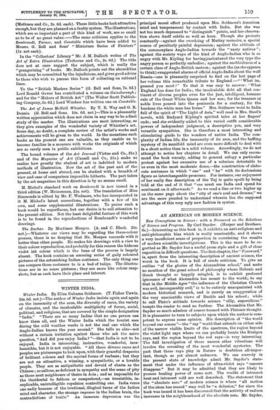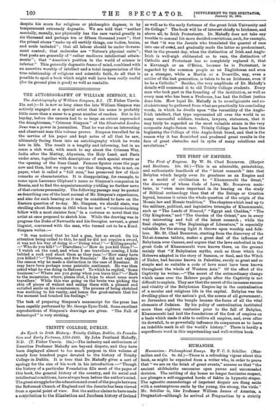AN AMERICAN ON MODERN SCIENCE.
New Conceptions in Science : with a Foreword on the Relations of Science and Progress. By Carl Snyder. (Harper and Brothers. 6s.)—Interesting as this book is, it exhibits an anti-religious and anti-philosophic bias which is really unscientific, and it shows a very insufficient sense of proportion in correlating the results of modern scientific investigations. This is the more to be re- gretted as Mr. Snyder has a useful prose style and a gift of clear exposition in difficult questions. The first chapter, the "Foreword," is, apart from the interesting description of ancient science, the worst in the book. It is full of crude criticism. To give an outline "of the glories of the Alexandrian school," and make no mention of the great school of philosophy where Hebraic and Greek thought so happily mingled, is to exhibit profound ignorance of what Alexandria has meant to the world; to say that in the Middle Ages "the influence of the Christian Church was evil, incomparably evil," is to be entirely unacquainted with modern historical research, and is merely an exaggeration of the very unscientific views of Buckle and his school ; while to call Plato's attitude towards science "silly, supercilious" tempts the reader to read no further. The Alexandria that Mr. Snyder so much admires of course teemed with Platonic thought. It is pleasanter to turn to subjects upon which the author is com- petent to express some opinion. His description of "the world beyond our senses "—the " ray " world that extends on either side of the narrow visible limits of the spectrum, the region beyond the violet light rays where we can probably locate the Röntgen rays, and the region beyond the red rays—is very interesting. The full investigation of these unseen other vibrations will involve the revealing of the most wonderful mysteries. The part that these rays play in Nature is doubtless all-impor- tant, though as yet almost unknown. We can scarcely in the present state of knowledge admit Mr. Snyder's state- ment that under the influence of ultra-violet rays "cancers disappear." But it may be admitted that they are likely to possess healing power of some sort. The worlds of intensest heat and intensest cold are well described. The statement that the "absolute zero" of modern science is where "all motion of tho atom has ceased" may well be "a delusion," for since the book was issued it has been discovered that the activity of radium increases in the neighbourhood of the absolute zero. Mr. Snyder,
despite his scorn for religious or philosophic dogmas, is by temperament extremely dogmatic. We are told that "neither mentally, morally, nor physically has the race varied greatly in six thousand and perhaps ten or fifteen thousand years "; that the primal atoms "make up all earthly things, our bodies, brains, and souls included "; that all labour should be under Govern- ment control ; that molecules are "Nature's physical units"; that poets are generally of "rather mediocre intellectual attain- ments"; that "America's position in the world of science is inferior." This generally dogmatic frame of mind, combined with an assertive worship of intellect and a total inappreciation of the true relationship of religious and scientific faith, do all that is possible to spoil a book which might well have been really useful (for its ground plan is good) as well as readable.























































 Previous page
Previous page